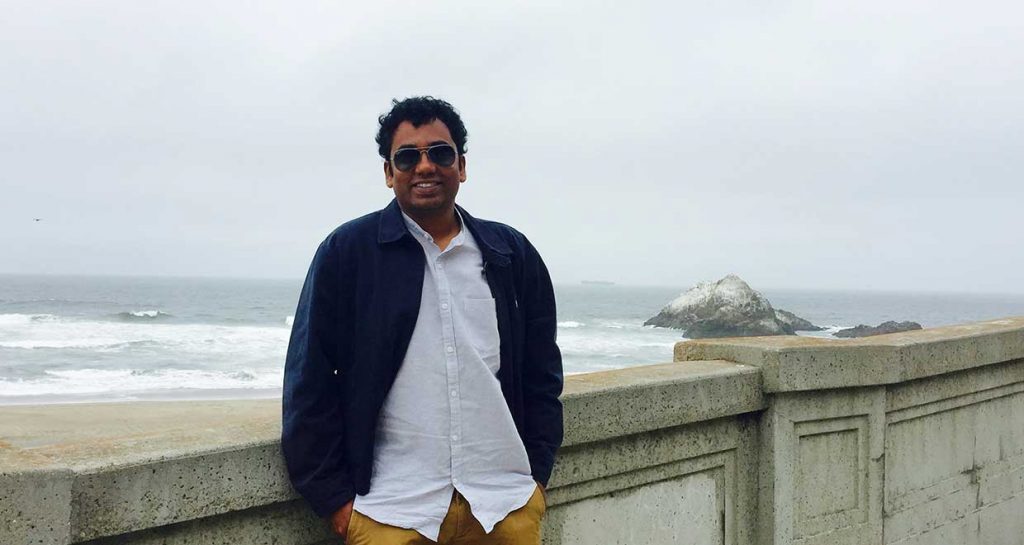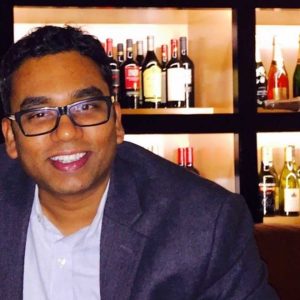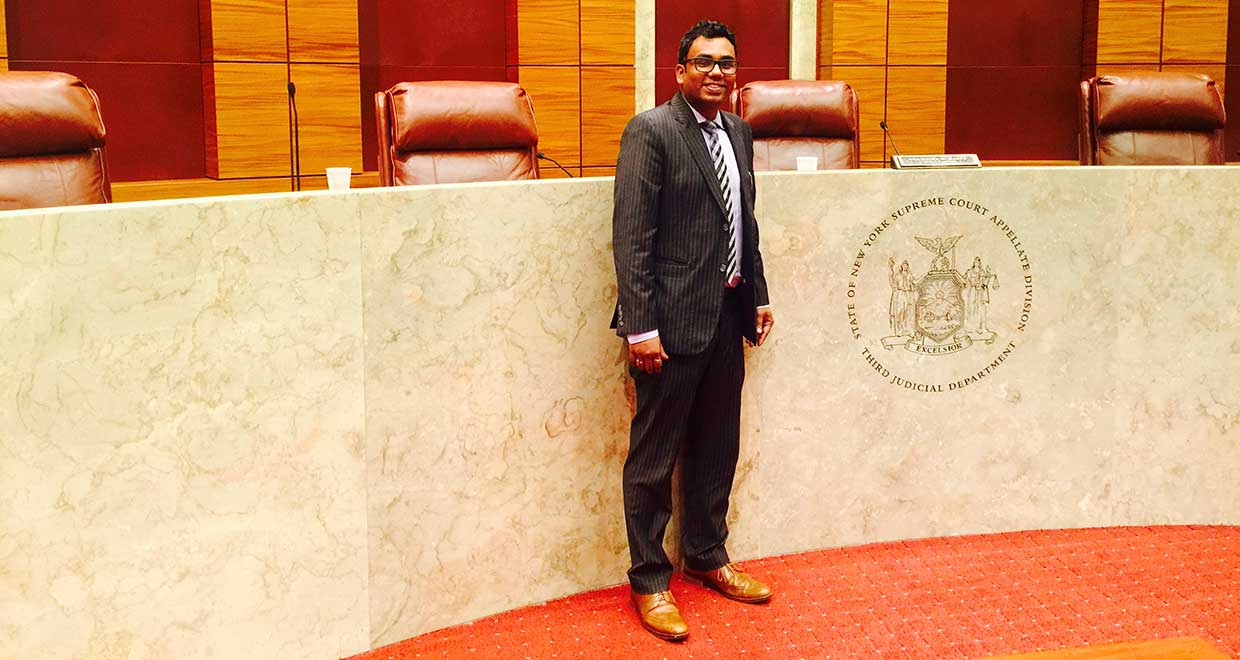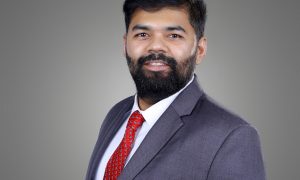Shivam Kumar Bimal is a graduate from Symbiosis Law School, Pune, batch of 2010. He currently serves as an employment tax, employee benefits and executive compensation attorney with Deloitte Tax LLP in the Greater New York area. He is licensed to practise law in India as well as in the jurisdiction of New York State. While at law school, he was involved in several extra-curricular activities. After finishing his undergraduate studies, Shivam worked as a law clerk for a year under Justice Surinder Singh Nijjar (now retired) at the Supreme Court of India. In 2011, he moved to the U.S. to pursue his LL.M. from the prestigious George Washington University Law School and was awarded the reputed Thomas Beurgenthal Scholarship. After the completion of his LL.M., he worked with a litigation tax law firm in Washington D.C. for three years before moving on to assume his present designation at Deloitte.
In this interview, we talk to him about:
- Studying at George Washington University and bagging a scholarship
- Working with the distinguished tax team at Deloitte
- Prerequisites for a role in international tax practice
What do your current job responsibilities entail?
My present job position is both challenging and exciting, as it provides me with many opportunities to learn. My responsibilities include advising and representing corporate clients before the Internal Revenue Service (IRS) and state taxing authorities for tax audits and/or employment tax-related issues. I also advise clients on issues related to qualified and non-qualified retirement plans, health and welfare benefits, executive compensation, and deferred compensation plan arrangements. I have also advised clients on issues related to Foreign Account Tax Compliance Act (FATCA) and Common Reporting Standard (CRS) under OECD.
What, according to you, is the most important part about law school?
Grades are by far the most important factor for law students. When I was in law school, we only had semester end exams and it was easy to achieve high grades compared to the current CPGA system. The new CGPA curriculum is more competitive and demands greater attention and hard work from students. In my opinion, good grades will play a vital role initially to get you a first job. That being said, publications, moot courts and other extracurricular activities are also important. Drafting articles for publications and participating in moot court competitions provide a platform to improve research, drafting and oratory skills. I personally feel that publications and being a part of law review helped me be a better lawyer.
How would you describe your experience of having worked as a law clerk under the tutelage of a reputed Supreme Court judge?
After my graduation from Symbiosis Law School in 2010, I worked with Justice Nijjar for over a year. It was one of the most challenging and enriching moments for me. Assisting a Supreme Court Judge is a daunting task for any fresh law graduate. In India, generally law clerks and judges share a very formal relationship. However, Justice Nijjar was an exception. He was friendly, thoughtful and always shared his experiences with his law clerks.
I remember working several late nights and weekends to prepare draft judgments, briefs on SLPs and other ongoing matters. I consider myself fortunate to contribute, in my small capacity, to numerous landmark judgments written by him, particularly, Iridium India Telecom Ltd. v. Motorola. I still share a very close relationship with Justice Nijjar and am grateful for all his help and mentorship.

How did you decide on pursuing an LLM from the George Washington University Law School?
I remember my conversation with Justice Nijjar where he described how studying in the UK shaped his career. I had applied to top universities in the UK and the US and was fortunate to receive acceptance from almost all the universities which I applied to. I decided to attend GW for its high academic calibre as well as the fact that GW offered me the Thomas Buergenthal scholarship, which covered my full tuition. Moreover, GW is based in the heart of Washington, DC and would provide me with access to many great networking opportunities.
At GW, I specialized in Business and Finance and was required to take 24 credits including a thesis or research paper. The courses I took included US law courses like federal tax, international tax, corporations, securities law, antitrust law etc., as well as skilled based class like international negotiations.
How can higher education in the US be distinguished from that in India?
I had a great time at GW and I am grateful to all my professors and peers. We had students from 62 different countries. Sharing my ideas and engaging in thoughtful debate with some of the best legal brains from around the world was an unmatched experience. It was also a unique cultural exchange with fellow peers. The fact that GW professors are all experts in their fields, either as judges, renowned academics, or leading attorneys in reputed law schools, allowed them to pass on applied lessons grounded in real-world experiences. This was one area which I really benefited from.
In India, generally, we were taught what happened in a particular case where as in the US, we were taught why and how it happened in a particular case. Basically, law schools in the US try to develop analytical thinking skills in students. Attaining LL.Ms from Indian universities is not a popular choice amongst students, unless they want to get into academia whereas in the US, students opt for an LL.M if they want to specialize in a particular field.
How did you decide on your courses?
I had taken many core US law courses like US Securities law, corporations, and US federal tax, etc. I wanted to gain as much exposure as I could on US laws. I wanted to utilize my experiences and knowledge on US law as well as Indian law after my graduation from GW. I particularly liked tax law because it was challenging, technical and was required for every corporate transaction.

How did you win the scholarship?
The Scholarship is awarded in the name of an International Court Justice, Thomas Beurgenthal (now retired). It is awarded to foreign LL.M students in the form of full or partial tuition waiver on the basis of academic merit and financial need. To apply one has to submit his/her resume along with a 500 word letter to prove yourself worthy of a scholarship. They also require a statement of purpose and letters of recommendation.
What extra-curricular/co-curricular activities were you part of while at law school?
Extracurricular activities are extremely important as it’s an opportunity to develop skills necessary to succeed as an attorney as well as an opportunity to enrich one’s resume, which is an important element when applying to LL.M programs. Some of the extra-curricular activities which I participated in include an essay competition titled “Women’s participation at the grassroots level”, in which our team was awarded the first prize of INR 50,000. Further, I represented my law school in a client counselling competition, successfully completed numerous projects sponsored by the UN. I also was an editor of the law review and headed the legal aid cell at law school. Moreover, some of my articles were published in law firms’ archives and NGO yearbooks. While pursuing my LL.M at GW, I was elected to be the President of the LL.M Student Association.
In order to pursue an LL.M from a tier one law school, one needs to conduct proper planning. Apart from grades, top universities look at your extracurricular activities. Securing a scholarship from any university is never easy and one needs to have an exceptional resume. Remember, it is not a matter of selection, but rather a matter of rejection. They reject all until they get their desired selected candidates.
How big of a difference does an Ivy League institution make?
Obviously Ivy League law schools are extremely prestigious and can open many doors. However, many people have this notion that getting an LL.M from an Ivy League guarantees you a job abroad, which is false. Another misconception is that attending an Ivy League school will provide you with the best education available. However, one must take into account the specialization that they want to acquire. For example, someone who wants to do an LL.M in Intellectual Property (IP) may choose Stanford or GW, which are not Ivy League schools but are better ranked in that specialization.
Tell us about your experience working in the US.
Apart from my internships, my work experience in India was limited to my time clerking for Justice Nijjar, which was a very demanding role. Similarly, in the US, I found that attorneys are also given demanding work which calls for long hours. Generally speaking, I find the nature of work between US and India to be different. In the US, attorneys have more client based exposure than in India, especially at the early stages of one’s career. Also, in the US, attorneys are expected to draft all legal documents in a crisp and concise manner. While this was important in India as well, it was less emphasized than in my positions in the US.
What do you think about the future of international tax practice?
Nowadays, it is very common to have corporate transactions involving multiple jurisdictions and corresponding tax implications. Therefore, it is actually a boon for someone who is a qualified lawyer in multiple jurisdictions. If you can interpret tax laws of multiple jurisdictions then you are an asset for any organization you work with. However, it is a niche field where you need a plethora of experience to gain expertise.
I would advise young lawyers to start with an internship and to ascertain whether you are a good fit or not. I believe a couple of law firms in India have a good international law practice. Keeping an eye on international transactions through journals is also a good way to keep yourself updated. You can also go for higher studies if you want to practise globally.
Would you like to leave a final message for all our anxious student readers?
Do not stress out, law school is challenging but fun. Internships will be important to gain practical knowledge and to ascertain what kind of law you would like to practice after graduation. Apart from aiming for good grades, participate in extracurricular activities and give back to society in any capacity, for eg. pro-bono work. Remember, a lawyer never stops learning until he/she retires. Lastly, do not forget to make memories. Cheers!
























